Cephalopods - Study guides, Class notes & Summaries
Looking for the best study guides, study notes and summaries about Cephalopods? On this page you'll find 56 study documents about Cephalopods.
All 56 results
Sort by

-
(5) Cephalopods lec 13/14, Exam Questions and answers, rated A+/ APPROVED EXAM PREDICTION PAPER/
- Exam (elaborations) • 12 pages • 2024
-
- $7.99
- + learn more
(5) Cephalopods lec 13/14, Exam Questions and answers, rated A+ how do young octopods learn? observationally, mom dies when hatch what is a radula? reinforced teeth that drill holes into bivalves Brainpower Read More Previous Play Next Rewind 10 seconds Move forward 10 seconds Unmute 0:01 / 0:15 Full screen what is a funnel? modified foot w/ jet propulsion (directionality) what is countershading? dark top + light bottom allows for camouflage of nautilus what are siphuncles...
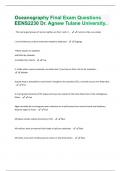
-
Oceanography Final Exam Questions EENS2230 Dr. Agnew Tulane University Questions And Answers Rated A+
- Exam (elaborations) • 16 pages • 2024
- Available in package deal
-
- $7.99
- + learn more
. The two largest groups of marine reptiles are the ( ) and ( ) . - marine turtles, sea snakes ( ) are Herbivorous marine mammals related to elephants - dugongs • More people are attacked and killed by saltwater crocodiles than sharks - true 5. Unlike other marine mammals, sea otters lack ( ) and rely on their rich fur for insulation. - blubber A great drop in atmospheric ozone levels, thought to be caused by CFCs, currently occurs over Antarctica. - true A much greater diversity of f...
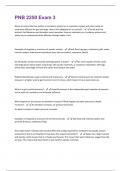
-
PNB 2250 Exam 3 Questions And Answers Latest Updates
- Exam (elaborations) • 27 pages • 2024
- Available in package deal
-
- $7.99
- + learn more
Name an animal that has neither a circulatory system nor a respiratory system and relies solely on cutaneous diffusion for gas exchange. How is this adequate for its survival? - Small and thin animals, like flatworms and horsehair worm parasites, have no respiratory or circulatory systems and solely rely on cutaneous/cuticle diffusion through water or air. Examples of respiratory structures of aquatic animals - bulk flow (sponges, cnidarians), gills, water vascular system, arborescent respi...
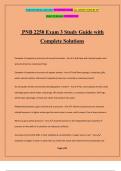
-
PNB 2250 Exam 3 Study Guide with Complete Solutions
- Exam (elaborations) • 43 pages • 2024
- Available in package deal
-
- $12.49
- + learn more
©GRACEAMELIA 2024/2025 ACADEMIC YEAR. ALL RIGHTS RESERVED FIRST PUBLISH OCTOBER 2024 Page 3/43 Name one aquatic and one terrestrial animal that has the opposite physiological setup: one that lacks a circulatory system (at least one used primarily for gas exchange) and respires using bulk flow of the medium (water or air) - Ans:-Bulk flow animals have no circulatory system Aquatic: sponge, cnidarian Terrestrial: insect (tracheal system and spiracles) Name an aquatic and terrestrial anima...
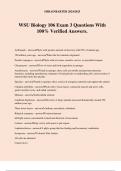
-
WSU Biology 106 Exam 3 Questions With 100% Verified Answers.
- Exam (elaborations) • 14 pages • 2024
- Available in package deal
-
- $10.49
- + learn more
WSU Biology 106 Exam 3 Questions With 100% Verified Answers. Arthropods - answerPhyla with greatest amount of diversity with 85% of animal spp 700 million years ago - answerWhen the first animals originated Porifera (sponges) - answerPhyla with no tissues, muscles, nerves, or specialized organs Choanocytes - answerFlow of water and food acquisition in sponges Amoebocytes - answerFound in sponges, these cells are mobile and perform numerous functions, including reproduction, transport of f...
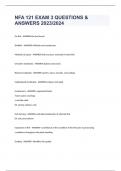
-
NFA 121 EXAM 3 QUESTIONS & ANSWERS 2023/2024
- Exam (elaborations) • 7 pages • 2023
-
Available in package deal
-
- $8.99
- + learn more
NFA 121 EXAM 3 QUESTIONS & ANSWERS 2023/2024 Fin fish - ANSWER-flat and round Shellfish - ANSWER-Mollusks and crustaceans Mollusks (3 types) - ANSWER-Soft structure, enclosed in hard shell Univalves (mollusks) - ANSWER-abalone and conch Bivalves (mollusks) - ANSWER-oysters, clams, mussels, and scallops Cephalopods (mollusks) - ANSWER-octopus and squid Crustaceans - ANSWER--segmented body -horny outer coverings -crust-like shell EX. shrimp, lobster, crab Fish farming ...
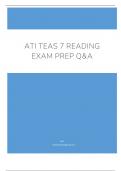
-
ATI TEAS 7 READING EXAM PREP Q&A
- Exam (elaborations) • 71 pages • 2024
-
- $12.99
- + learn more
ATI TEAS 7 READING EXAM PREP Q&A.Brilliant Octopuses When thinking of intelligent animals, dolphins and elephants may be the first to come to mind. However, researchers have observed octopuses to be startlingly brilliant creatures. Octopuses have displayed curious behavior, such as pulling out loose tank valves, opening jars, and escaping their tanks when no one was watching. In 2010, a German octopus named Paul was even said to have correctly predicted the outcome of all seven of Germany’...
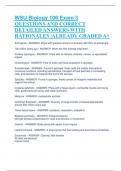
-
WSU Biology 106 Exam 3 QUESTIONS AND CORRECT DETAILED ANSWERS WITH RATIONALES |ALREADY GRADED A+
- Exam (elaborations) • 14 pages • 2023
- Available in package deal
-
- $13.99
- + learn more
WSU Biology 106 Exam 3 QUESTIONS AND CORRECT DETAILED ANSWERS WITH RATIONALES |ALREADY GRADED A+ Arthropods - ANSWER- Phyla with greatest amount of diversity with 85% of animal spp 700 million years ago - ANSWER- When the first animals originated Porifera (sponges) - ANSWER- Phyla with no tissues, muscles, nerves, or specialized organs Choanocytes - ANSWER- Flow of water and food acquisition in sponges Amoebocytes - ANSWER- Found in sponges, these cells are mobile and perform numer...
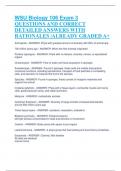
-
WSU Biology 106 Exam 3 QUESTIONS AND CORRECT DETAILED ANSWERS WITH RATIONALES |ALREADY GRADED A+
- Exam (elaborations) • 14 pages • 2023
-
- $12.99
- + learn more
WSU Biology 106 Exam 3 QUESTIONS AND CORRECT DETAILED ANSWERS WITH RATIONALES |ALREADY GRADED A+ Arthropods - ANSWER- Phyla with greatest amount of diversity with 85% of animal spp 700 million years ago - ANSWER- When the first animals originated Porifera (sponges) - ANSWER- Phyla with no tissues, muscles, nerves, or specialized organs Choanocytes - ANSWER- Flow of water and food acquisition in sponges Amoebocytes - ANSWER- Found in sponges, these cells are mobile and perform numer...
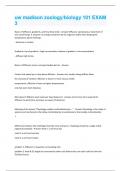
-
uw madison zoology/biology 101 EXAM 3 Questions With 100% Correct Answers.
- Exam (elaborations) • 44 pages • 2024
-
- $8.39
- + learn more
Basics of diffusion, gradients, and how they relate - Answer-Diffusion: spontaneous movement of very small things. It requires no energy investment by the organism (other than keeping the temperature above freezing) --direction is random Gradients: top of gradient = high concentration, bottom of gradient = low concentration --diffuses high to low Basics of diffusion across a semipermeable barrier - AnswerFactors that speed up or slow down diffusion - Answer-size: smaller things diffuse fas...

How did he do that? By selling his study resources on Stuvia. Try it yourself! Discover all about earning on Stuvia


